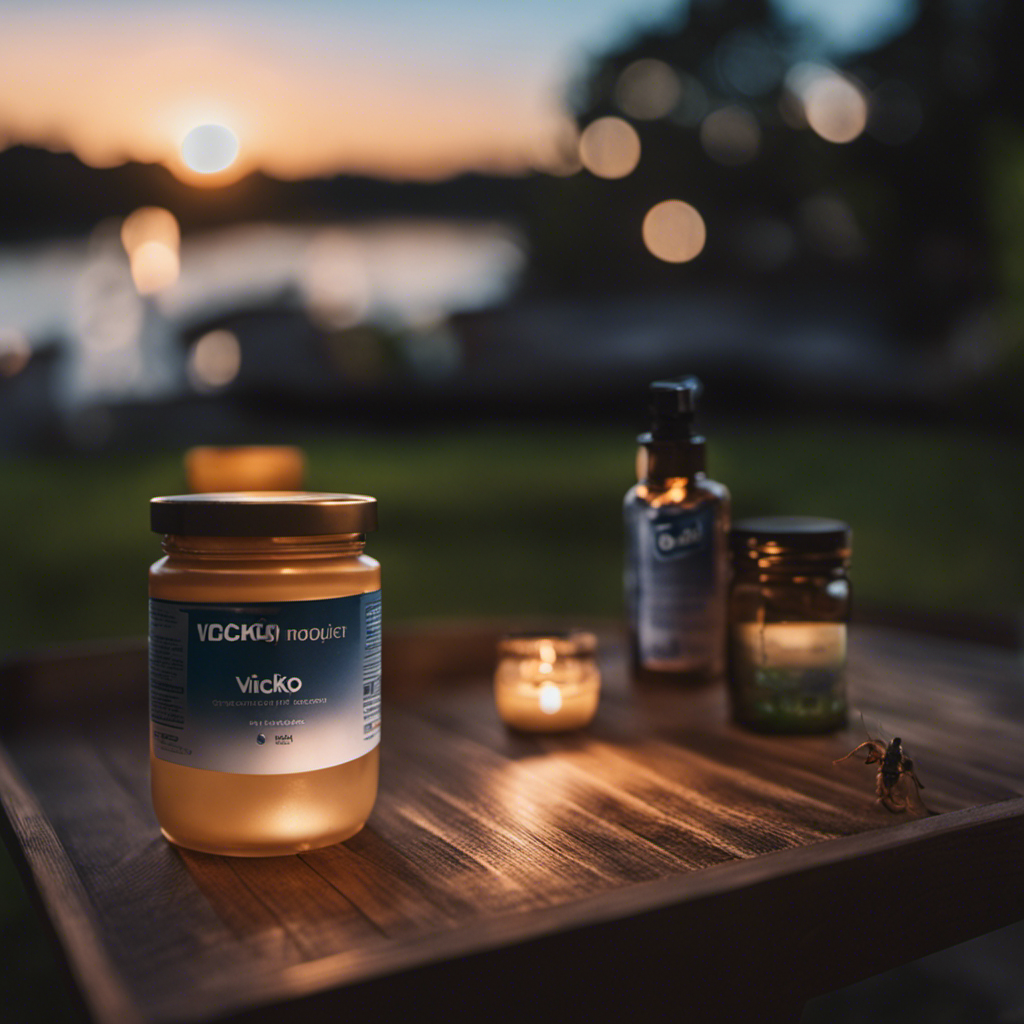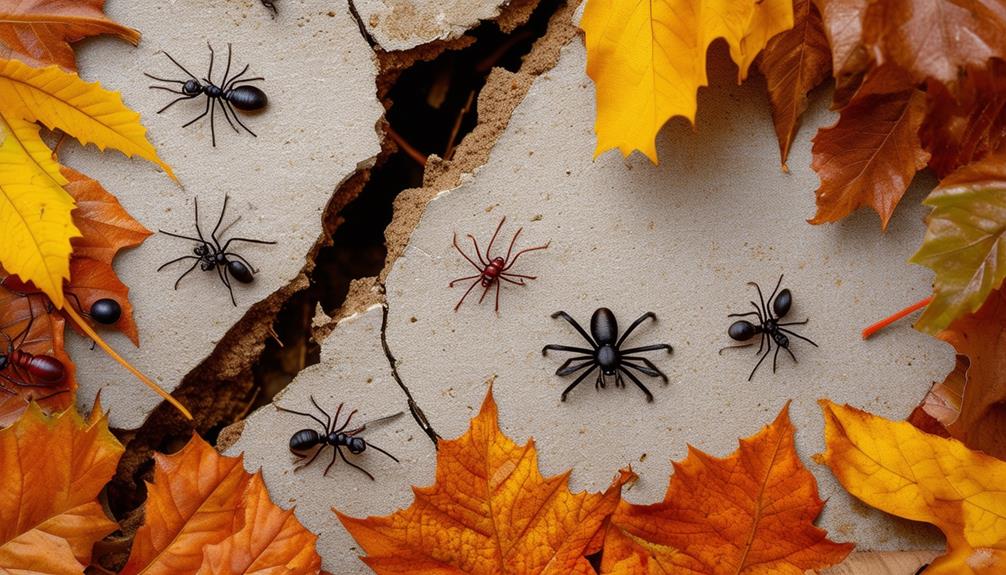In recent years, there has been a growing interest in natural remedies for mosquito control. One such remedy that has gained popularity is Vicks Vaporub.
Many people claim that applying this mentholated ointment can repel mosquitoes effectively. However, before relying on this product, it is essential to understand the science behind its efficacy.
This article aims to explore the myth behind Vicks Vaporub’s mosquito repellency and provide alternative natural remedies, as well as best practices for using this product to serve individuals seeking mosquito control solutions.
Key Takeaways
- Scientific research has debunked the belief that Vicks Vaporub is an effective mosquito repellent.
- Vicks Vaporub contains camphor, menthol, and eucalyptus oil, but limited scientific evidence supports its efficacy as a mosquito repellent.
- Potential risks of using Vicks Vaporub include skin irritation and allergic reactions.
- Alternative natural remedies such as essential oils and homemade repellents offer safer and more environmentally friendly options for mosquito control.
The Myth Behind Vicks Vaporub and Mosquito Repellency
Contrary to popular belief, the supposed mosquito-repellent properties of Vicks Vaporub have been debunked by scientific research. While there has been a long-standing controversy surrounding the effectiveness of Vicks Vaporub as a mosquito repellent, scientific studies have consistently shown that it is not an effective solution for keeping mosquitoes at bay.
Numerous user testimonials have claimed that applying Vicks Vaporub to exposed areas of the body can repel mosquitoes. However, these testimonials are purely anecdotal and lack scientific evidence to support their claims. In fact, studies have demonstrated that Vicks Vaporub has no significant impact on mosquito behavior or their attraction to humans.
It is important to rely on scientifically proven methods of mosquito repellency, such as using EPA-approved insect repellents containing ingredients like DEET or picaridin. These products have been extensively tested and proven to effectively repel mosquitoes, ensuring the safety and comfort of individuals seeking protection from mosquito-borne diseases.
Understanding the Ingredients in Vicks Vaporub
To gain a comprehensive understanding of Vicks Vaporub, it is essential to examine the ingredients contained within the product.
Vicks Vaporub is a topical ointment that contains a combination of active ingredients such as camphor, menthol, and eucalyptus oil. These ingredients are known for their soothing properties and have been traditionally used for relieving cough and cold symptoms.
While Vicks Vaporub is commonly used as a remedy for respiratory issues, some individuals have also claimed that it can repel mosquitoes. However, the effectiveness of Vicks Vaporub as a mosquito repellent is debatable.
While some people may find temporary relief from mosquito bites when using Vicks Vaporub, there is limited scientific evidence to support its efficacy. Additionally, there may be potential risks associated with using Vicks Vaporub as a mosquito repellent, such as skin irritation or allergic reactions.
It is always advisable to consult a healthcare professional for appropriate mosquito repellent options.
Scientific Studies on Vicks Vaporub as a Mosquito Repellent
Numerous scientific studies have been conducted to investigate the effectiveness of Vicks Vaporub as a mosquito repellent. These studies aimed to determine if the menthol and camphor present in Vicks Vaporub could repel mosquitoes effectively.
The results of these studies have been mixed, with some showing promising results and others suggesting limited efficacy. One study conducted in 2005 found that Vicks Vaporub provided up to 4 hours of protection against certain mosquito species. However, it is important to note that the effectiveness of Vicks Vaporub may vary depending on factors such as mosquito species, concentration of active ingredients, and individual reactions.
Additionally, some studies have highlighted limitations, such as short duration of protection and the need for frequent reapplication. Therefore, while Vicks Vaporub may offer some level of mosquito repellency, it is advisable to use it in conjunction with other proven mosquito repellents for optimal protection.
Alternative Natural Remedies for Mosquito Control
In addition to Vicks Vaporub, there are other natural remedies that can be used for mosquito control. Essential oils are a popular choice for repelling mosquitoes naturally. Certain oils, such as citronella, lavender, and eucalyptus, have been found to be effective in keeping mosquitoes at bay.
These essential oils can be mixed with a carrier oil, such as coconut or olive oil, to create a homemade mosquito repellent. Simply apply the mixture to exposed skin or clothing to repel mosquitoes.
Another natural remedy is the use of homemade mosquito repellents. These can be made using ingredients such as vinegar, witch hazel, and herbs like basil or mint. These homemade repellents are not only effective but also safe for the environment and gentle on the skin.
Best Practices for Using Vicks Vaporub to Repel Mosquitoes
How can Vicks Vaporub be used effectively to repel mosquitoes?
Many people are looking for natural and safe alternatives to chemical mosquito repellents such as DEET. Vicks Vaporub has gained popularity as a potential mosquito repellent due to its strong scent and ingredients like eucalyptus oil and camphor. While there is limited scientific evidence to support its effectiveness, many individuals claim that it helps keep mosquitoes at bay.
When using Vicks Vaporub as a mosquito repellent, it is important to follow some best practices. First, apply a thin layer to exposed skin, avoiding sensitive areas such as the eyes and mouth. Reapply every few hours for maximum effectiveness.
Additionally, consider using other mosquito control measures like wearing long sleeves and pants, using mosquito nets, and eliminating stagnant water sources around your living area.
Frequently Asked Questions
Can Vicks Vaporub Be Used as a Mosquito Repellent for Other Insects Too?
Vicks Vaporub is not proven to be effective as a mosquito repellent for other insects. It is recommended to use alternative natural mosquito repellents, such as citronella oil or DEET, which have been scientifically tested for their effectiveness.
What Are the Potential Side Effects of Using Vicks Vaporub as a Mosquito Repellent?
When considering the potential side effects of using Vicks Vaporub as a mosquito repellent, it is important to note that alternative methods for mosquito control exist. These alternatives may be more effective and have fewer potential side effects.
How Long Does the Mosquito-Repelling Effect of Vicks Vaporub Typically Last?
The duration of the mosquito-repelling effect of Vicks Vaporub varies depending on factors such as application method and environmental conditions. For information on how to apply Vicks Vaporub as a mosquito repellent or make homemade repellent, please refer to our guidelines.
Does the Effectiveness of Vicks Vaporub as a Mosquito Repellent Vary Based on the Individual’s Body Chemistry?
The effectiveness of Vicks Vaporub as a mosquito repellent can vary based on individual factors such as body chemistry. Alternative natural ingredients like citronella and eucalyptus oil have shown efficacy in repelling mosquitoes.
Are There Any Specific Precautions to Take While Using Vicks Vaporub as a Mosquito Repellent?
When using Vicks Vaporub as a mosquito repellent, it is important to take certain precautions. These include conducting a patch test to check for allergies and avoiding contact with the eyes and mouth.





